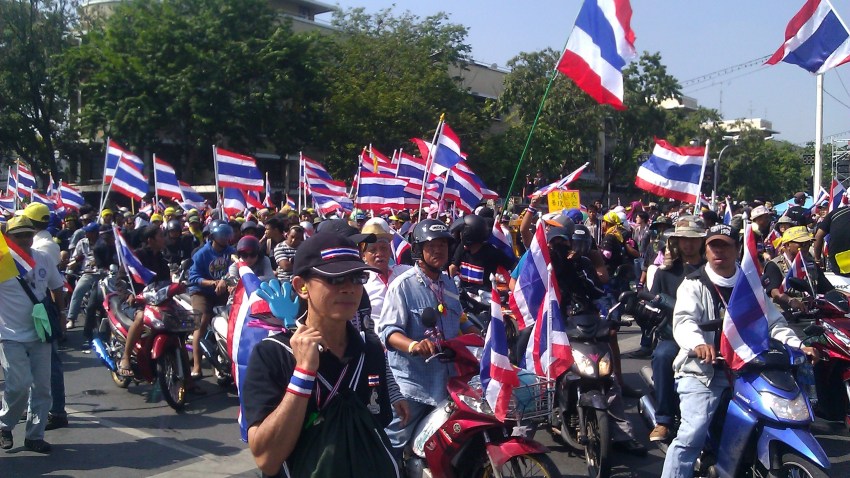Thailand’s
political deadlock has shifted from the streets of Bangkok to the courts. It is there that the real battle is now being played out.
A March 21 ruling by the Constitutional Court invalidating the result of the country’s Feb. 2 election most vividly highlighted the change of venue. The court, with a vote of 6-3, threw the current turmoil onto a new trajectory. When the court made a similar ruling in 2006, annulling an election result, the military swooped in and installed a new, unelected government.
The judicial instruments that are now being used to wade into Thailand’s political crisis were established in the wake of the 1992 Black May protests, which left 52 dead. The 1997 “People’s Constitution” established the Constitutional Court, the Election Commission and anti-corruption institutions. Since then, these institutions have become increasingly politicized—a situation exacerbated when the 2007 constitution gave considerable new power to the judiciary.
Bjorn Dressel, an academic who has studied the politicization of Thailand’s judiciary,
outlined the situation bleakly in a 2010 paper: “Led by decisions of the Constitutional Court, judges have dissolved major political parties, banned senior executives from politics, toppled two prime ministers and directly challenged major government policies. Their decisions have drastically altered the Thai political landscape, with far-reaching consequences for democratic governance.”
One of the first examples of the court’s involvement in such contentious cases came in 2001, when Thaksin Shinawatra was acquitted by the court of charges that he incorrectly filed a statement on his wealth in order to become prime minister. He held office until 2006 with considerable influence over much of the judiciary.
Thaksin's influence faltered, however, and in 2006, following a Democrat Party boycott of elections held in April that year, the Constitutional Court invalidated the election results. In the midst of the judicial offensive, the court also jailed election commissioners for malfeasance—an incident certainly remembered by the Election Commission today. Shortly after the rulings, in 2007, Thaksin’s Thai Rak Thai Party was dissolved, changing the country’s political landscape and setting a new and nasty precedent.
The court’s most recent ruling has many concerned again. The decision rests on a dubious interpretation of
Section 108 of the constitution. The section states that “a new general election must be fixed for not less than 45 days but not more than 60 days as from the day the House of Representatives has been dissolved, and such election day must be the same throughout the Kingdom [of Thailand].”
The court objected that the February general election did not take place on one single day throughout the country. Yet many believe the court’s interpretation to be incorrect. They argue that the wording of the constitution—its reference to the same day—refers to the date for which the election is fixed; the constitution, therefore, does not stipulate that the voting process must be completed entirely on this one day.
Indeed, it was due to protests and organized boycotts that some 28 of Thailand’s 375 constituencies were unable to hold votes on the planned election day. As a result, the court’s ruling sets yet another new and dangerous precedent. In effect, it means that if a boycott against an election successfully disrupts voting in one constituency, then the boycotting party can later lobby the court for the entire nationwide election to be ruled invalid. As such, while the court’s invalidation of the election result does have a precedent in the 2006 ruling, the latest ruling seems far more worrying.
Prime Minister Yingluck Shinawatra’s current caretaker government may entertain the idea of a new election. If it were in fact held, the Pheu Thai Party—led Yingluck, Thaksin’s sister—would likely win and walk away with greater legitimacy.
As such and perhaps unsurprisingly, a Democrat Party spokesperson stated that the opposition party may again boycott fresh elections if the government holds them before national reform takes place. The implication is that the unelected “People’s Council” reform body proposed by protest leader Suthep Thaugsuban must be put in place before any elections can take place—a wholly undemocratic demand, and one unacceptable to Pheu Thai and to much of the international community.
In March, the BBC stated that a former army official, now an adviser to the pro-Shinawatra Red Shirt movement, told the news agency that 200,000 armed guards
would be ready to march on Bangkok if Yingluck were forced from office. Whether the court’s invalidation of the election results counts as Yingluck’s being forced from office will be a subject of hot debate among many Red Shirts. Regardless, tempers are flaring and patience over the current deadlock is growing thin. This is all the more worrying given the recent change in leadership within the Red Shirts’ United Front for Democracy Against Dictatorship—the new leader appears to have more of an appetite for conflict.
Indeed, with the battle in the judiciary to force new elections, and with Yingluck due to face charges before the National Anti-Corruption Commission that could lead to her impeachment, the country’s political crisis seems to be coming to a head.
If history is any indicator, the battle will eventually move back from the courts and into the streets. In the past this has led to bloodshed and military coups. Both now look increasingly more likely than any peaceful resolution in the courts.
Elliot Brennan is a nonresident research fellow at the Institute for Security & Development Policy in Sweden and a nonresident fellow at Pacific Forum Center for Strategic and International Studies in the U.S. He contributes regularly from Bangkok on Thai politics for the Lowy Institute’s Interpreter blog. He can be reached at ebrennan@isdp.eu and on Twitter at @elliotbrennan.

